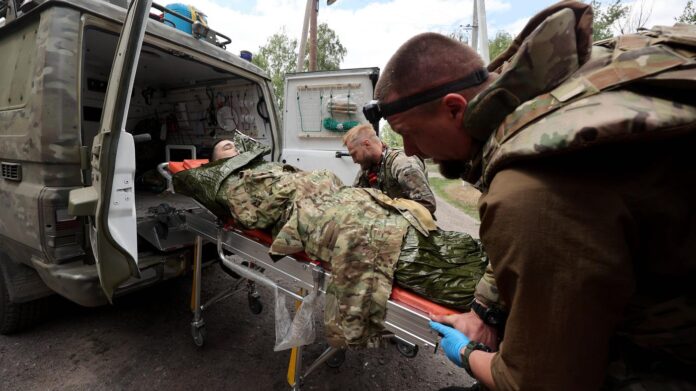
In many cities in eastern Ukraine there are not enough hospital beds for soldiers wounded in the war. They often have to be transported to places hundreds of kilometers away. But how? For people in a critical condition, long medical transports are risky and helicopter flights over Ukraine are dangerous.
For some, a train is a lifesaver. It’s like a hospital on rails. Reporters from “CNN” were allowed to ride on it (source here). The train has become an important part of the Ukrainian health system. Wounded people are cared for here while they are being taken from the front to hospitals. As “CNN” reports, everything is being done in complete secrecy, so the media outlet is not even revealing the route of the train.
“The most difficult part is the evacuation from the front,” says Oleksandr, captain of the Ukrainian medical forces and chief doctor of the platoon. “Combat medics working on the front lines die just like soldiers.”
On the train, he and his team can “do almost anything.” There is even a fully equipped intensive care unit. However, they can only perform minor operations. “We have to be very careful when selecting patients,” he says. 90 percent of his patients have splinter injuries. Many have had limbs amputated, some need ventilators.
To prevent it from rocking, the train travels at about 80 kilometers per hour, about half the speed of a normal train. It also has priority over all other trains. Despite this, the intensive care unit is constantly shaking. Every piece of equipment and every bed has to be secured to the floor.
Previously, Oleksandr says, the train would have taken tourists to the Carpathians. Today it has taken on a completely new function. The train hospital is an example of the Ukrainian ingenuity that the war inevitably brought with it.
The most important news of the day at a glance:
- In the western Russian region of Kursk, Russia has launched a counter-offensive to recapture territory controlled by Ukraine, according to consistent statements by both warring parties. The Russian Defense Ministry announced on the online service Telegram that the soldiers had succeeded in recapturing ten towns within two days. Ukrainian President Volodymyr Zelensky confirmed the counter-offensive. In view of the military situation, he accused the Western allies of being too hesitant in supporting his country.
- Russian secret services have increased their espionage against German aid to Ukraine and the Bundeswehr. As a result, the primarily strategic interest of the Russian services in military policy and strategy has “increasingly shifted to the tactical level,” writes the Military Counterintelligence Service (MAD) in its new annual report. Read more about this here.
- According to Secretary of State Antony Blinken, the United States is prepared to adjust and “readjust” military support for Ukraine as needed. Blinken was asked at a press conference in Warsaw whether the Americans had now given Ukraine the green light to attack targets inside Russia with Western weapons. He replied: “I can tell you that we will continue to do exactly what we have been doing so far: we will readjust, we will adapt if necessary, including with regard to the means available to Ukraine.”
- According to authorities, at least 14 Ukrainian civilians were injured in a Russian drone attack in the city of Konotop in northeastern Ukraine overnight. According to the regional prosecutor’s office, several residential buildings, schools and shops were damaged. Electricity and water were cut off in the city, which had a population of just under 90,000 before the Russian war of aggression.
- Ukrainian President Volodymyr Zelenskyy has denounced a deadly Russian attack on vehicles of the International Committee of the Red Cross (ICRC) in the east of his country. “Another Russian war crime,” wrote Zelenskyj on the online service Telegram. “Today the occupier attacked the vehicles of the humanitarian mission of the International Committee of the Red Cross in the Donetsk region.” Three ICRC employees were killed and two others injured.
- According to influential Russian foreign policy expert Sergei Karaganov, Russia should clearly signal its willingness to use nuclear weapons. The main goal of the Russian nuclear doctrine should be “to convince all current and future enemies that Russia is ready to use nuclear weapons,” Karaganov says in an interview with the Russian newspaper Kommersant.
- A conservative Iranian politician has expressed unusual criticism of his country’s relations with Russia amid new sanctions and diplomatic tensions. In a post on the X platform, Ali Motahari, former vice president of parliament, referred to the new sanctions imposed by Germany, France and Great Britain because of Iran’s delivery of ballistic missiles to Russia. At the same time, Motahari complained about diplomatic tensions with the Russian government over its Caucasus policy. Iran’s Foreign Ministry vehemently denies the missile deliveries.
- Turkish President Recep Tayyip Erdogan has called for the return of the Crimean peninsula, annexed by Russia, to Ukraine. “Our support for the territorial integrity, sovereignty and independence of Ukraine is unwavering. The return of Crimea to Ukraine is a requirement of international law,” the Turkish head of state said in a video message at the summit of the so-called Crimea Platform. Read more here.
